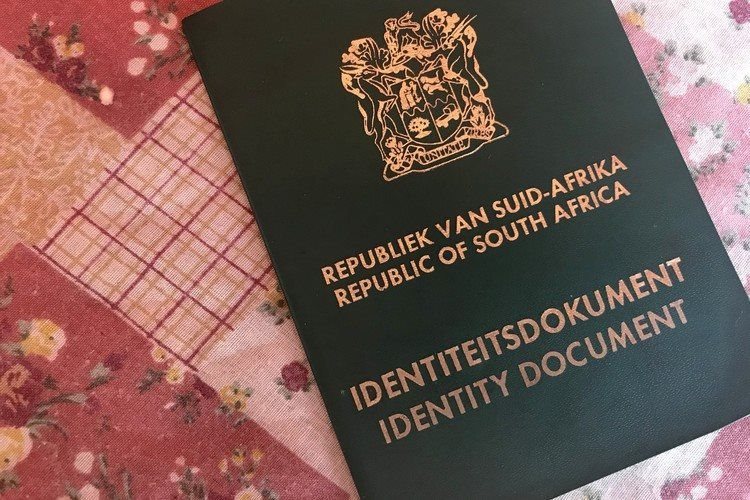Judge gives scathing ruling with punitive cost order.

About 700,000 IDs have been blocked by the Department of Home Affairs without due process. Archive photo: Ashraf Hendricks / GroundUp
- A woman and three organisations took Home Affairs to court for blocking identity documents without following a just administrative process.
- About 700,000 IDs were blocked as of September 2023, meaning people with these IDs could not obtain passports, could not vote, access health care, education or open bank accounts.
- Their children, who were linked to the IDs, suffered similarly.
- This week the Pretoria High Court found that Home Affairs has been acting unconstitutionally. The judge gave the department 12 months to remedy the situation.
The blocking of IDs by the Department of Home Affairs, without notice, timeous investigation and appeal processes, has been declared unconstitutional.
Pretoria High Court Judge, Elmarie van der Schyff, said that the Director-General had a responsibility to protect the integrity of the national population register by “placing a marker” against any suspicious ID. But to block the ID without following any just administrative procedure “constituted a mischief”.
The case before her was brought by Phindile Mazibuko, who had been personally affected by ID blocking, Lawyers for Human Rights and LegalWise South Africa, with the Children’s Institute being admitted as an amicus curiae.
It was opposed by the Minister and Director-General of Home Affairs.
The applicants argued that hundreds of people had complained that their IDs had been blocked, without prior notice and with no reasons given.
They could not obtain passports, could not vote, could not access healthcare, education or open bank accounts. Their children, who were linked to the IDs, suffered similarly.
Judge van der Schyff, in her ruling this week, said the department had submitted that ID blocking was to prevent foreign nationals abusing systems to access benefits reserved for South African citizens and permanent residents.
The department placed a “marker” next to the ID which automatically resulted in the ID numbers being blocked, without advising the affected party, despite all of its prejudicial consequences.
The judge said lawyers for the respondents had submitted that the department had recently unblocked more than 1.8-million blocked IDs but, at the time of the application hearing (September 2023), there were still 700,000 blocked IDs.
During the litigation, and relatively close to the trial date, the respondents had conceded that blocking IDs without a fair and just administrative process was inconsistent with the Constitution. They said that Home Affairs was in the process of developing a procedurally fair and transparent process.
But the court still had to consider whether or not there was any legal justification for ID blocking at all.
Tania Broughton 18 Sep 2023
“Having regard to the DG’s responsibility to protect the integrity of the national population register, I am of the view that the placing of a marker against an ID to establish if it needs to be investigated cannot be faulted.
“The issue arises, however, when placing a marker prejudicially affects the individual to whom the ID was assigned without following just administrative procedures,” the judge said.
This was tantamount to “seizing” an ID prior to any proper investigation or communication with the affected person.
She said the existing legal framework did not provide for placing a marker against an ID that would inevitably result in the concerned individual’s ID being blocked during the investigation stage.
A mere “suspicion” did not justify this unless it was authorised through a court order.
“Such conduct stands to be reviewed. I am of the view that the blocking of IDs is justified after a fair administrative procedure is followed and a final decision is taken to revoke, cancel or withdraw the ID under applicable legislation.
“It is the [Department of Home Affairs] that jumped the gun.”
The judge suspended the declaration of invalidity for 12 months, giving the department time to determine the status of IDs presently blocked and to deal with clients of Lawyers for Human Rights and Legal Wise within 90 days.
She also ordered the immediate removal of any blocks on minor children whose parents’ status as South African citizens or permanent residents has not been finally revoked.
On the issue of costs, she said the application had been brought about by the department’s prolonged and persistent failure to develop and implement a constitutionally compliant process. It had ignored the jurisprudential value of Ubuntu.
“Their belated concession that the process they followed until November 2022 did not promote administrative justice is of no consolation to the hundreds of thousands of individuals affected by this practice.
“This violation of constitutionally enshrined rights by the respondents, the prejudice caused particularly to minor children when there is ample law on the rights of children, their lackadaisical approach to investigate and resolve the underlying issues in any manner other than randomly blocking IDs justifies the granting of a punitive costs order,” she said.
Tania Broughton 13 Dec 2023
Ruling welcomed by Children’s Institute
Paula Proudlock, senior researcher at the Children’s Institute, welcomed the ruling and said compliance would be monitored.
“The court says that Home Affairs must lift blocks from the IDs of children whose parents’ IDs are under investigation and blocked. And Home Affairs must file a report with the court within 12 weeks confirming that they have lifted the blocks.
“This part of the order should assist children aged 16 to 18 who have birth certificates but have been unable to get their IDs because their parent’s ID has been marked or blocked. Home Affairs will need to send a directive to their local offices explaining this change,” she said.
How children will benefit
The Court also said that Home Affairs may not prevent a child’s birth from being registered because their parent’s ID is under investigation. In these circumstances, Home Affairs must register the child’s birth as a citizen or permanent resident and give the child an ID number.
“We are very pleased by this relief as this is the main reason we entered the case. One of our clients, Ms Zulu, a South African citizen, was prevented from registering her newborn triplets because her ID was under investigation.
She and the three babies suffered great hardship at a time when they were at their most vulnerable. Her ID was eventually cleared and unblocked after a year due to advocacy by a dedicated dietician at the public hospital treating her and the triplets. Her story illustrates that citizens, permanent residents and refugees get caught up in the blocking system because it is done on mere suspicion and before a fair process and proper investigation has been completed,” said Proudlock.
This article was originally published on GroundUp.
© 2023 GroundUp. This article is licensed under a Creative Commons Attribution-NoDerivatives 4.0 International License.
































